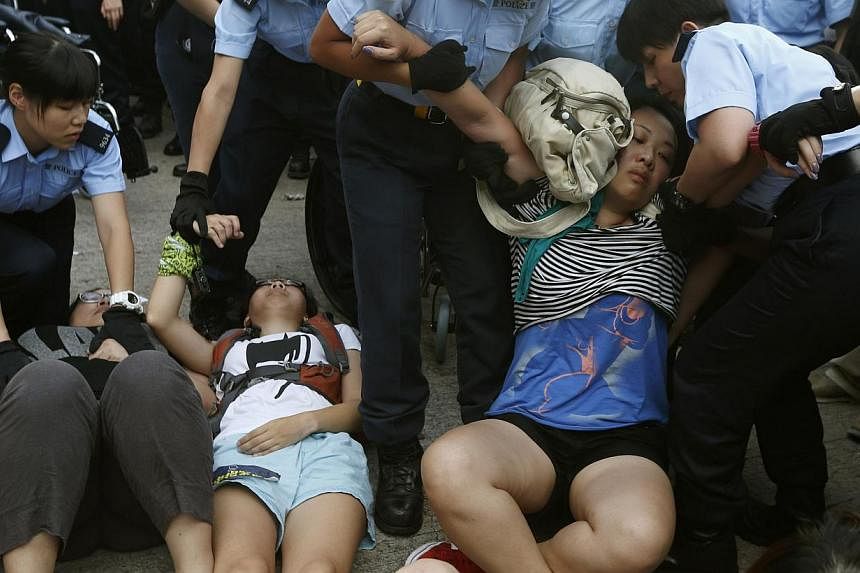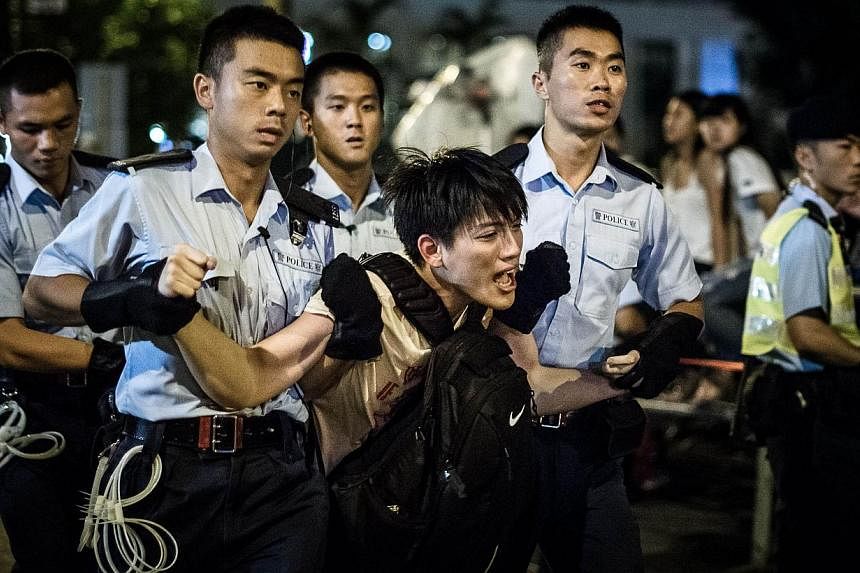SOME sobbed, others kicked out, as they were carried away.
By 8.30am Wednesday, following a five and half-hour police operation, Chater Road in Hong Kong's financial district was finally cleared, ending the city's biggest exercise of civil disobedience in recent history.
A total of 511 people were arrested, said the police. They are accused of illegal assembly and obstructing police officers in their execution of duty.
By mid-morning, traffic flowed again through one of the main arteries in Central.
Hundreds of students and activists had blockaded the road overnight, settling down in the shadows of the city's iconic buildings like the HSBC skyscraper, in a bid to lobby for greater democracy.
They had begun their sit-in on Tuesday night, following their march earlier in the day.
Thus did Hong Kongers mark the 17th anniversary of their city's return to Chinese rule, a reflection of the political turbulence that now roils it - and the widening chasm between the city and the central government.
Many who turned up were propelled by anger over the belief that Beijing was undermining Hong Kong's autonomy, and want the government to introduce what they call "genuine democracy".
Undergraduate Vivian Chui, 23, had told The Straits Times she was ready to be arrested for her act of civil disobedience. "This is our Hong Kong and we are its future. If we don't fight for universal suffrage, it will die."
"They can't arrest all of us," she added.
The afternoon march, which began at Victoria Park and ended at Chater Road, had attracted 510,000 people, said its organisers, a record high since the annual ritual began in 2003. Police put the number at 98,600 at its peak.
The permit for the public event expired at midnight, which meant that the overnight blockade was illegal.
It began with about 1,000 people, sitting on Chater Road stretching for hundreds of metres from the Hong Kong Club Building, past Statue Square, Mandarin Oriental Hotel, to St George's Building at Ice House Street. Some left after midnight, but many remained, sitting or lying on the ground.
The police operation began at 3am after repeated calls for the gathering to disperse.
The protesters then organised themselves into rows, inter-linking their arms.
Moving in swiftly with barricades to hive off bystanders, some of whom became agitated, officers began carrying the protesters off one by one, bundling them into travel coaches.
Some shouted: "I want genuine universal suffrage!" while others flashed the victory sign from the buses.
The sit-in was organised by the Federation of Students, an umbrella network of university unions here, to demand public nomination in the constitutional reform for Hong Kongers to elect their own leader in 2017.
This was inspired by an Occupy Central movement, which aims to mobilise up to 10,000 people as a last resort, but felt that the time was not right now. It had just completed an unofficial referendum during which nearly 800,000 Hong Kongers voted for their desired democratic model and want to give the government time to respond.
Dr Benny Tai, one of Occupy Central's organisers, criticised the police for its action early Wednesday morning, noting that the student organisers had pledged to leave the area by 8am.
Another group of students led by the Scholarism student movement camped out outside the Chief Executive's office in Admiralty.
A white paper on the one country, two systems framework released by Beijing last month had also racheted up tensions, with fears that the central government is tightening the screws on the city.
In what is bound to infuriate the Communist Party, some protesters on Tuesday waved the Republic of China flag to indicate that they would have preferred a "return to Nationalist rule" - an addition to the British colonial-era flag that has made an appearance in previous years.
Obliquely acknowledging the negative public sentiment, two senior Beijing officials on Tuesday laced their comments with a mix of cajoling and haranguing.
Chinese Vice-President Li Yuanchao called on Hong Kong youth to "learn Chinese culture and inherit the mindset of 'loving China and loving Hong Kong' ", saying: "I urge young Hong Kongers to tie their personal destiny to that of the motherland and Hong Kong."
Beijing's top official in Hong Kong Zhang Xiaoming lambasted "the tiny group of radicals carrying out illegal activities", and said that the protest turnout will not change the central government's mind about electoral reform.
While Beijing has promised Hong Kong universal suffrage, or one-man, one-vote rights, to elect their leader in 2017, the Basic Law - the city's mini-Constitution - states that there has to be a "broadly representative nominating committee" to pre-select candidates.
Hong Kongers fear the "nominating committee" will deprive electors of genuine political choice, given that Beijing has stipulated candidates must "love Hong Kong" and "love China" - viewed as a byword for a supporter of the Communist Party.
Retired accountant Lau Shui Kee, 69, was so concerned that he turned up with his entire family - including his 75-year-old wife and three-year-old granddaughter.
"We came to fight for Hong Kong's universal suffrage. We want our own leader, we want our own voices heard."
Despite capricious weather that swung between humid heat and thundery showers, Hong Kongers of all ages and backgrounds gathered at Victoria Park before marching through Causeway Bay, Wan Chai and Central. Many said they were there for the first time, the turnout of which serves as a barometer for the city's mood.
Mr Wang Wei, 50, a businessman from Guangzhou said he was shocked by the sight.
"Hong Kongers are so great and brave! At home, people are whispering about the corrupt officials, but no one can come out and shout that we want this and that official to step down."
He added that he believes that Hong Kong can be a role model for mainland China.
"When universal suffrage - as Hong Kong people want - can really take place here, maybe it means that things will change in China."
Additional reporting by Pearl Liu



